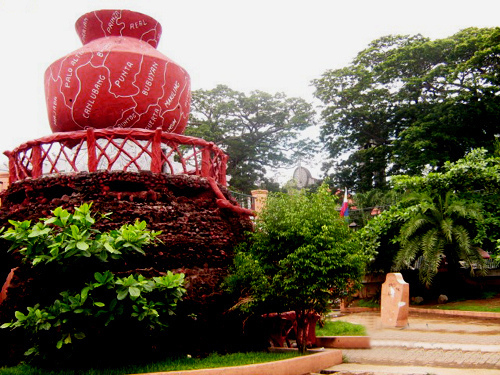April 21, 2001 was the day that changed the course of history of Calamba. After over seven years of waiting,  Calamba became the second component city of the Province of Laguna by virtue of Republic Act No. 9024, “An Act Converting the Municipality of Calamba, Province of Laguna into a Component City to be known as the City of Calamba.” R.A. 9024 was signed into law by Her Excellency President Gloria Macapagal-Arroyo on March 5, 2001 at the Malacañang Palace. The Commission on Elections (COMELEC) then set the plebiscite for Calamba’s cityhood on April 21, 2001, three weeks before the local elections.
Calamba became the second component city of the Province of Laguna by virtue of Republic Act No. 9024, “An Act Converting the Municipality of Calamba, Province of Laguna into a Component City to be known as the City of Calamba.” R.A. 9024 was signed into law by Her Excellency President Gloria Macapagal-Arroyo on March 5, 2001 at the Malacañang Palace. The Commission on Elections (COMELEC) then set the plebiscite for Calamba’s cityhood on April 21, 2001, three weeks before the local elections.
Events leading to Cityhood
As early as 1994, the town’s Sangguniang Bayan approved Resolution No. 60, Series of 1994 requesting the Senate of the Philippines thru its president and the House of the Representatives thru its speaker to co-sponsor a bill for Calamba’s conversion into a city. It was only after two years that another resolution, Resolution No. 115 was passed requesting then Honorable Congressman Joaquin M. Chipeco Jr, now Calamba City Mayor to co-sponsor a bill for Calamba’s cityhood and requesting the Sangguniang Panlalawigan for their comments and recommendations regarding the matter. Another two years passed before House Bill No. 986 and Senate bill Nos. 1630 and 1791 were filed in the House of Representatives by Congressman Chipeco and Senate of the Philippines by Senators Franklin M. Drilon and Sergio Osmeña, III, respectively.
It was only in the year 2000 that the motion for Calamba’s cityhood was fast tracked. Then Mayor and now City Vice-Mayor Severino J. Lajara requested favorable endorsement of House Bill No. 986 from the Sangguniang Panlalawigan on January 3, 2000. The Sangguniang Bayan also endorsed House Bill No. 986 and Senate Bill Nos. 1630 and 1791 and also requested favorable endorsement from the Sangguniang Panlalawigan on the same month. A month passed and Mayor Lajara sent a follow-up letter to then Vice-Governor Teresita “Ningning” Lazaro on updates regarding the matter.
On March 8, the House Committee on Local Government approved House Bill No. 986 on 2nd reading at a hearing held at Hotel Rembrandt, Quezon City, MM. The same House Committee conducted a public hearing on House Bill No. 986 at the Calamba Elementary School (Central II) gymnasium on March 23, approving the House Bill in principle. House Bill 986 was deliberated in April by the House of Representatives in plenary session and approved as House Bill No. 10661, which was then filed with the Senate of the Philippines in June.
The year 2001 came and brought about approval on 2nd reading of Senate Bill Nos. 1630 and 1791 and House Bill No. 10661 in a hearing held on February 5 at the Ambrocio Padilla Hall, Senate of the Philippines. Three days later, February 8, Senate Bill Nos. 1630 and 1791 and House Bill No. 10661 was deliberated in Plenary Session and was approved as Republic Act No. 9024.
Calamba’s dream of becoming a city was slowly becoming a reality when Her Excellency, then President Gloria Macapagal-Arroyo signed into law Republic Act No. 9024 “An Act Converting the Municipality of Calamba, Province of Laguna into a Component City to be known as the City of Calamba” on March 5, 2001. The Commission on Elections (COMELEC) then set the plebiscite on April 21, 2001.
Publications and Campaign
The campaign for Calamba’s cityhood was intensive and widespread. Numerous posters, billboards and streamers encouraging Calambeños to go out and vote in the coming April 21 plebiscite for Calamba’s cityhood were placed in strategic locations around the municipality. Barangay patrol services equipped with loud speakers were also utilized to spread information. Since the plebiscite coincided with the summer season and the implementation of the Special Program for the Employment of the Students (SPES), the said participants were also employed to hand-out flyers in all barangays. The City Planning and Development Office, then the Municipal Planning and Development Office, has produced brochures, both in English and Filipino, outlining the benefits and advantages of becoming a city. One set was distributed during the Public Hearing held at the Central II gymnasium on March 23, 2000. Another set of brochures along with a comic strip geared towards persuading Calambeños to vote “YES” to Calamba’s cityhood, was distributed in all the barangays of Calamba. From March 30 to April 19, two teams of representatives from various departments of the municipal government conducted information education campaigns in all the fifty-four (54) barangays. Presenters from each team talked about the requirements, process, benefits and advantages of cityhood and how Calambeños can help in making this dream a reality. An open forum, where residents can voice out their opinions and questions, followed the presentation. Most of the questions centered on possible changes in taxation and delivery of basic services. Calambeños reacted positively to Calamba’s impending cityhood and expressed their wholehearted support in this endeavor.
Plebiscite Results
A vast majority of Calambeños took part in the historic plebiscite, which determined the destiny of Rizal’s hometown. Of the total fifteen thousand fifty-six (15,056) Calambeños who voted, only three thousand four hundred thirteen (3,413) or 22.67% vote “No”. The remaining 77.33% voted “Yes” to Calamba’s conversion into a component city.





